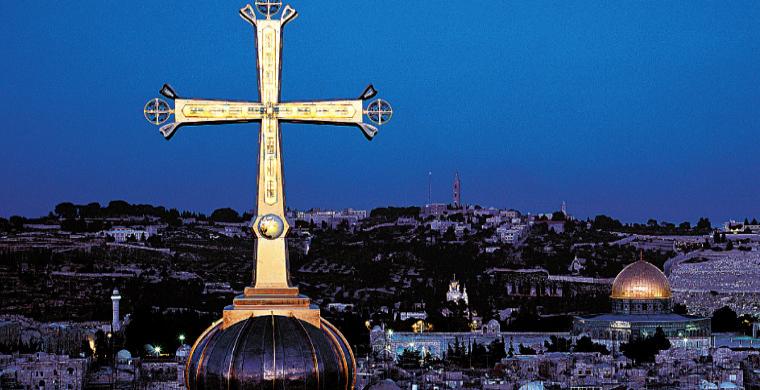What Should Christians Think about Israel's Seventieth Birthday?
By Gerald R. McDermott
https://providencemag.com/2018/05/christians-think-israels-seventieth-birthday/
May 15, 2018
Few would have estimated 70 years ago, let alone one thousand, that this week would arrive. On Monday, May 14, Israel celebrated the seventieth anniversary of becoming a nation. In light of this remarkable and unlikely reality, Christians are faced with the task of celebrating and interpreting this event against the backdrop of the last 70 years. To that end, I want to suggest three words to inform the way in which Christians consider Israel's birthday: light, fulfillment, and firstfruits.
First, Israel is a beacon of light in the darkness of the Middle East. The Jewish state is the only nation in that vast region where Arabs can criticize the government by day and not worry that thugs will knock on their door that night. It is the only country in the region where Arab Christians can raise their children with full religious freedom. Everywhere else in that neighborhood Christians take risks to go to church or train their children to follow Jesus openly. Nowhere else in the Middle East is there full religious and political freedom for religious and political minorities. This is why two million Arabs are citizens of Israel with access to world-class healthcare and education for their children. They don't seek to emigrate to Gaza or the West Bank because they know they will have far less freedom and a diminished lifestyle under Palestinian leadership in either territory.
Second, the birth of the Jewish state 70 years ago was a fulfillment of Old Testament prophecy. Moses predicted that there would come a day when the Jewish people would be "scattered among all the nations," but at some point "the LORD your God will gather you" and "will bring you into the land that your fathers possessed, that you may possess it. And he will make you more prosperous and numerous than your fathers" (Deut. 30:1-5).
Some think this was fulfilled when Jews returned from the Babylonian exile at the end of the sixth century BC. But the Jews were neither more numerous nor more prosperous than when they flourished under David and Solomon. The same is true of their brief century of self-rule under the Hasmoneans from 165--63 BC. They would never have said they were prosperous under Roman hegemony after 63 BC nor during the first century when they chafed under their Roman overlords. And no one would say they prospered in the last two thousand years in the land when for most of those centuries they suffered under Christians and Muslims.
Not until the massive ingathering of Jews to the land in the nineteenth century did Jews begin to approach the state of being more numerous and more prosperous. The prosperity in terms of self-rule began only in 1948 when Israel gained her independence, and then in 1967 when she gained unfettered access to her holiest places and all of her historical capital Jerusalem.
On her seventieth birthday this week, Israel is more numerous and more prosperous than ever before--at least since the times of her ancient kings David and Solomon. When no other ancient people has survived with its religion and culture intact, and no other people has been persecuted with such demonic ferocity for thousands of years, it is a modern miracle that the ancient people of Israel are back with their ancient language and culture, and back on their ancient land, as Moses prophesied more than three thousand years ago.
It was not only the ancient Jews who prophesied a return to the land from the four corners of the earth (Isai. 11:12), but Jesus and his apostle Peter as well. They did not believe that the ancient prophecies of return to the land had been fulfilled yet. In his second speech in Jerusalem, Peter forecasts a future apokatastasis (Acts 3:21) that was yet to come. This is the Greek word used in the Septuagint for the future return of the Jews to the land from the four corners of the earth.
Jesus implicitly predicted a restoration of Israel when his disciples asked him if it was about to occur, and he said the Father had set the time for that (Acts 1:6). Jesus also predicted that one day Jerusalem would welcome him (Luke 13:35). Paul never said in so many words that the Jews would return to the land, for the Jews were living in the land when he flourished. But he writes about God's "gifts" to the Jews in Romans 11:29 and says that they are "irrevocable." For Hellenistic Jews such as Philo, Josephus, and Ezekiel he Tragedian, the primary "gift" of God to Israel was the land. It is the primary referent for "gift" in all of the Old Testament, and arguably for Paul, too.
Finally, we can also say that because the state of Israel protects God's covenanted people, it is a firstfruit pointing to the time when Jerusalem will once more be the center of the world (Rev. 20:9; 21:1-3).
Gerald McDermott is Anglican Chair of Divinity at Beeson Divinity School. He is the editor of The New Christian Zionism (IVP) and author of Israel Matters (Brazos).
Photo Credit: Golgotha Crucifix on the Church of the Holy Sepulchre in Jerusalem. By Michael Hammers Studios, via Wikimedia Commons.














